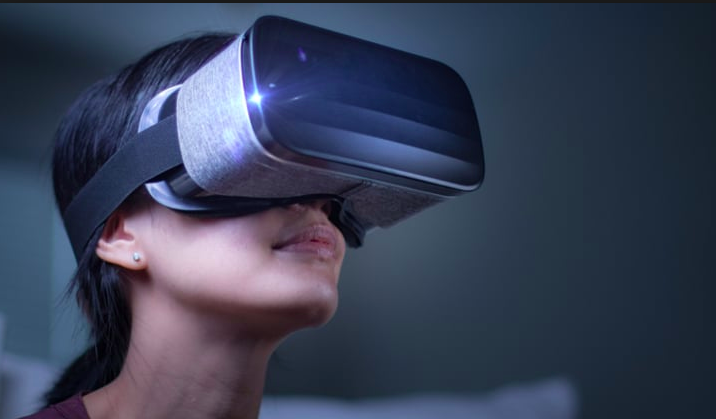
DDI Pioneers Groundbreaking Virtual Reality Experiences to Transform Soft Skills Training for Leaders
Could stepping into a virtual world be the secret to becoming a better leader in the real one?
Global leadership consulting firm DDI is pioneering groundbreaking new virtual reality (VR) training experiences that help leaders develop their soft skills. DDI is creating a library of VR scenarios that deliver powerful, memorable experiences that help leaders develop and practice critical leadership skills such as empathy, communication, and coaching in realistic scenarios.
“Virtual reality has the power to help leaders experience and manage emotion leadership situations in a way that no other tool or learning technique can,” said Ryan Heinl, director of product management and leader of DDI Labs. “Whether the goal is to help leaders gain empathy for what others are feeling or to give them a safe space to practice emotionally charged conversations, virtual reality changes the learning experience in a way we’ve never seen before in the industry. It’s a game changer.”
The VR experiences are developed by DDI Labs, which is DDI’s innovation studio focused on integrating cutting-edge technologies into leadership experiences. Working with top VR companies such as Strivr and Friends with Holograms to create the experiences, DDI offers a library of scenarios spanning several applications, including immersive experiences that help leaders understand diversity, and inclusion and interactive environments where leaders can practice skills such as coaching and having tough conversations.
Using Virtual Reality to Drive Diversity and Inclusion
For most organizations, creating a diverse and inclusive culture is a high priority but difficult to achieve. While most companies focus on creating awareness of why inclusion is important at an intellectual level, a rational understanding is often not enough to create measurable change. Because actions are primarily driven by automatic, emotional cognitive processes, leaders may struggle to translate intellectual understanding of the concept into action, particularly if they’ve been part of the “in-group” of the organization. DDI’s VR experience is designed to motivate behavioral change by having leaders feel, rather than merely understand, the need for inclusion.
Often called an “empathy-generating machine,” VR offers leaders the ability to truly walk in another person’s shoes. To enable people to feel what it’s like to be marginalized and undervalued at work, DDI has created an emotionally potent scenario in which the participant feels how frustrating it is to be outside of the “in-group” at work. The scenario is designed to be part of a larger session in which colleagues can discuss their experiences, share honest insights and generate a commitment to model and promote inclusive behaviors.
“In most cases, leaders don’t intend to be exclusionary, but it’s a natural part of being human that we tend to gravitate toward people like ourselves, which creates a lot of bias in the workplace,” said Tacy Byham, Ph.D., CEO of DDI. “Trying to accuse people or make them feel guilty for being part of the ‘in-group’ won’t work and is counterproductive. What VR enables us to do, however, is make people understand at a visceral, emotional level how exclusion works and the negative effect it has on people, including highly talented people who could be adding a lot of business value if given the chance.”
Practice Tough Conversations in a Safe Environment
Few leaders feel truly prepared for the difficult conversations they need to have, especially with their direct reports. While strong leadership skills can help these conversations be successful, leaders often feel unprepared for them, particularly at the emotional level. While traditional training programs offer highly effective preparation by guiding leaders through role-playing scenarios with a partner, VR creates a new opportunity to prepare for emotionally charged conversations in a psychologically safe environment where leaders aren’t afraid to make a mistake or seem silly in front of a colleague.
“In traditional skill practices where you’re paired with a practice partner, it’s unlikely that your partner is going to begin crying, become extremely defensive, or get angry,” said Heinl. “But these things happen in real leadership situations, and leaders need to be prepared for that. In the virtual world, we can prepare them for the worst possibilities in a safe environment, making them feel as confident as possible about going into the real thing.”
VR also offers the potential for on-demand practice outside of the classroom. Many leaders find it helpful to practice with a colleague right before a tough conversation, which may not always be possible depending on the availability of a peer or the private nature of the conversation. In these situations, VR offers something humans can’t: constant availability and privacy.
“As we’ve tested our virtual reality experiences with diverse sets of leaders, one thing has become clear: VR has forever changed the landscape of soft skills training,” said Byham. “We’re excited to be at the forefront of this new reality.”
Bring a virtual reality pilot to your organization by visiting ddiworld.com/VR.
About DDI
DDI is a global leadership consulting firm that helps organizations hire, promote and develop exceptional leaders. From first-time managers to C-suite executives, DDI is by leaders’ sides, supporting them in every critical moment of leadership. Built on five decades of research and experience in the science of leadership, DDI’s evidence-based assessment and development solutions enable millions of leaders around the world to succeed, propelling their organizations to new heights. For more information, visit ddiworld.com.
###
Contact:
Beth Almes
PR Manager, DDI
412-257-3623

